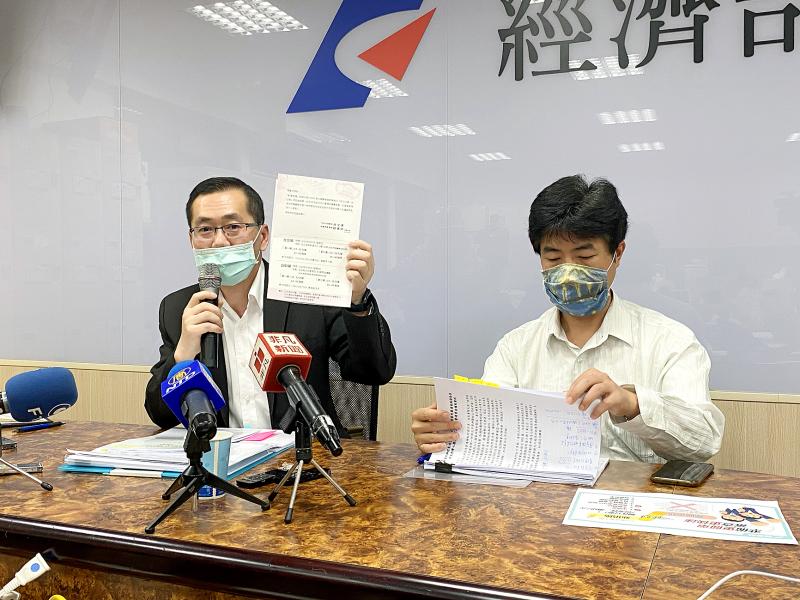The Industrial Development Bureau (IDB) has approved 756 of 1,224 applications from companies seeking government subsidies due to the effects of the COVID-19 pandemic, it said yesterday.
Of the approved applications, 280 are from base metal and machinery equipment makers, 188 are from consumer goods and chemical materials manufacturers, and 120 are from information and communication technology companies, IDB data showed.
The remaining applications are from businesses across various sectors, such as design, tourism and knowledge-based industries.

Photo: Huang Pei-chun, Taipei Times
“Applications are still pouring in and we are receiving an average of 100 applications per day,” IDB Deputy Director-General Yang Chih-ching (楊志清) said at a news briefing in Taipei.
Launched more than two weeks ago, the relief program is part of a wider economic stimulus package launched by the Ministry of Economic Affairs.
It is aimed at providing financial aid to businesses from the manufacturing and services sectors that are struggling with the effects of the pandemic.
Under the program, companies with a 50 percent annual decline in sales can receive wage subsidies of up to 40 percent per employee, to a maximum of NT$20,000 (US$667.78), as well as a one-time injection of working capital calculated based on NT$10,000 per employee.
“We have already handed out NT$734 million [in subsidies] to approved companies to help them pay April wages ... benefiting up to 33,957 employees,” Yang said, adding that the ministry plans to hand out another NT$1.12 billion this month and the next.
The ministry has allocated a total of NT$39.6 billion to fund the program as it seeks to subsidize wages of up to 660,000 employees.
Yang also refuted a previous suggestion from the ministry that it would lower the threshold for companies to qualify for the program by including firms that have posted a 30 percent annual decline in sales.
“After discussions with industry representatives, we have decided to maintain the 50 percent threshold while loosening certain criteria,” he said.
Under the new criteria, companies can show a 50 percent decline in sales by comparing with any monthly sales figures last year, instead of only monthly sales registered in January to June, he said.
In other news, the ministry yesterday approved an application from I-MEI Foods Co Ltd (義美食品) to take part in a government incentive program and invest NT$3 billion in a facility for recycling agricultural waste.
The company plans to set up a biomedical operations center equipped with smart production lines in Taoyuan’s Longtan District (龍潭區), the ministry said.
The ministry also approved an application from Winner Hydraulics Corp (武漢機械).
The maker of power packs and cartridge valves plans to invest NT$900 million expanding an existing plant in the Central Taiwan Science Park (中部科學園區), the ministry said.
Industrial panel maker Mildex Optical Inc (熒茂光學) plans to invest NT$100 million to relocate its core production from China to Taiwan and expand its existing plant in Kaohsiung, the ministry said.

Hon Hai Precision Industry Co (鴻海精密) yesterday said that its research institute has launched its first advanced artificial intelligence (AI) large language model (LLM) using traditional Chinese, with technology assistance from Nvidia Corp. Hon Hai, also known as Foxconn Technology Group (富士康科技集團), said the LLM, FoxBrain, is expected to improve its data analysis capabilities for smart manufacturing, and electric vehicle and smart city development. An LLM is a type of AI trained on vast amounts of text data and uses deep learning techniques, particularly neural networks, to process and generate language. They are essential for building and improving AI-powered servers. Nvidia provided assistance

GREAT SUCCESS: Republican Senator Todd Young expressed surprise at Trump’s comments and said he expects the administration to keep the program running US lawmakers who helped secure billions of dollars in subsidies for domestic semiconductor manufacturing rejected US President Donald Trump’s call to revoke the 2022 CHIPS and Science Act, signaling that any repeal effort in the US Congress would fall short. US Senate Minority Leader Chuck Schumer, who negotiated the law, on Wednesday said that Trump’s demand would fail, while a top Republican proponent, US Senator Todd Young, expressed surprise at the president’s comments and said he expects the administration to keep the program running. The CHIPS Act is “essential for America leading the world in tech, leading the world in AI [artificial

DOMESTIC SUPPLY: The probe comes as Donald Trump has called for the repeal of the US$52.7 billion CHIPS and Science Act, which the US Congress passed in 2022 The Office of the US Trade Representative is to hold a hearing tomorrow into older Chinese-made “legacy” semiconductors that could heap more US tariffs on chips from China that power everyday goods from cars to washing machines to telecoms equipment. The probe, which began during former US president Joe Biden’s tenure in December last year, aims to protect US and other semiconductor producers from China’s massive state-driven buildup of domestic chip supply. A 50 percent US tariff on Chinese semiconductors began on Jan. 1. Legacy chips use older manufacturing processes introduced more than a decade ago and are often far simpler than

Gasoline and diesel prices this week are to decrease NT$0.5 and NT$1 per liter respectively as international crude prices continued to fall last week, CPC Corp, Taiwan (CPC, 台灣中油) and Formosa Petrochemical Corp (台塑石化) said yesterday. Effective today, gasoline prices at CPC and Formosa stations are to decrease to NT$29.2, NT$30.7 and NT$32.7 per liter for 92, 95 and 98-octane unleaded gasoline respectively, while premium diesel is to cost NT$27.9 per liter at CPC stations and NT$27.7 at Formosa pumps, the companies said in separate statements. Global crude oil prices dropped last week after the eight OPEC+ members said they would